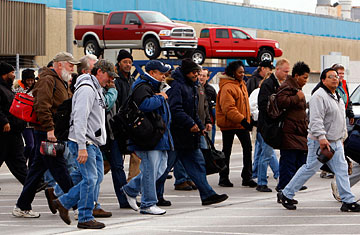
United Auto Workers employees leave a Chrysler plant in Warren, Mich., on Dec. 11
Senate Republicans and Democrats have been able to agree on precious little in the heated debate on whether to bail out the nation's beleaguered automakers. But in failing to reach a bipartisan compromise after marathon talks on Thursday, they effectively handed the hot-button issue to the person they believe should have dealt with it in the first place: President George W. Bush. And in a statement on Friday morning, the Administration said it would consider using the bank bailout money already approved by Congress to rescue the auto industry.
With General Motors warning that it would run out of money by the end of the month and Chrysler not far behind, the pressure is now firmly on the Bush Administration to find a way to provide $14 billion in short-term loans to keep the companies on life support until a new Congress and the incoming Obama Administration can hammer out a comprehensive solution next year. The White House had been dead set against the Democrats' original entreaties to use money from the $700 billion Troubled Assets Relief Program, known as TARP, passed by Congress in September to stabilize the teetering banking system, but now it may have no choice. (See TIME's top 10 financial collapses of 2008.)
"I dread looking at Wall Street tomorrow. It's not going to be a pleasant sight," Senate majority leader Harry Reid said with a twisted smile, both hands gripping the top of the lectern on the Senate floor late Thursday evening, before a compromise plan passed by the House on Wednesday went down to predictable defeat on the Senate floor by a vote of 52 to 35 (failing to meet the 60-vote threshold to cut off a filibuster). The last time Congress failed to pass a bailout plan that most had assumed was a done deal, the Dow Jones industrial average dropped 777 points in one afternoon. The stock market on Friday morning was down only modestly, however, most likely reflecting Wall Street's expectation that Bush will step in. (See the 50 worst cars of all time.)
The failed compromise bill crafted by Senate Democrats and the White House would have taken $14 billion from a green modernization fund passed by Congress earlier this year — a move at first ardently opposed by House Speaker Nancy Pelosi. "We think the legislation we negotiated provided an opportunity to use funds already appropriated for automakers and presented the best chance to avoid a disorderly bankruptcy while ensuring taxpayer funds only go to firms whose stakeholders were prepared to make difficult decisions to become viable," said Tony Fratto, a White House spokesman, responding to the vote. "We will evaluate our options in light of the breakdown in Congress."
If they had their way, Senate Republicans would prefer that no taxpayer money be given to Detroit, which finds itself on the verge of bankruptcy after years of mismanagement. In their minds, any handouts would just postpone the inevitable demise (or at least painful restructuring) of the industry. But most Republicans realize they can't afford to be blamed for letting hundreds of thousands of more Americans lose their jobs at the holidays, and many in their ranks believe that the outgoing leader of their party should take the political hit by authorizing the use of TARP funds himself.
For a while on Thursday, however, it looked like it might not come to that. After steadfastly refusing to negotiate in the beginning of the week on a plan they believed wouldn't force the Big Three to seriously restructure, Senate Republicans, led by Bob Corker of Tennessee, engaged in a marathon session of talks. By late in the day, it seemed like they might be amenable to a plan that would involve the automakers slashing their debt by March 31 and forcing the United Autoworkers Union to accept wage cuts that would put them on par with employees of foreign automakers, which operate plants in the U.S. "We were three words — three words — away from a deal. We offered any date in the year 2009 — any date," Corker said.
The UAW, however, would agree to meet wage parity only by 2011, when their existing contracts expire, a recognition that reopening them before then would clear the way for difficult and unpredictable votes. "Evidently, the only thing that matters to the majority on the other side of the aisle is that workers get paid too much in this country, and unless we sock it to the worker, they will not be willing to allow a $14 billion bridge loan in order to save an industry," said Senator Debbie Stabenow, a Michigan Democrat. "This is not tonight about Democrat and Republican. This is not about auto executives vs. workers. It's about the economy."
Many experts predict that given the complex interdependence of the Big Three and the network of small companies that supply them, a bankruptcy of even one could lead to a ripple effect that could jeopardize as many as 2.5 million jobs. Now the fate of those jobs, and the already tanking economy, are in the hands of a lame-duck President whom most Americans blame for the country's current woes.
See the 50 worst cars of all time.
Read "Is This Detroit's Last Winter?"
See pictures of the remains of Detroit.
